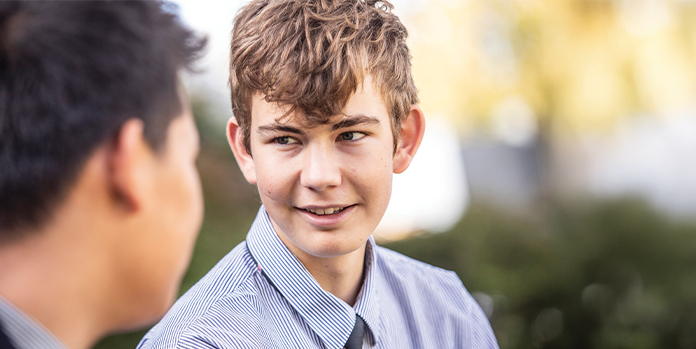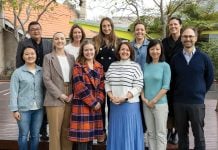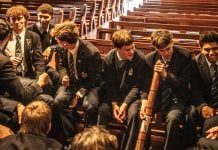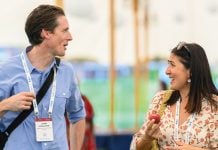When Year 11 student, Racer Adam, stepped up to the rostrum at the Ainger Peck Public Speaking Award competition, he stood in silence for a few moments before presenting his powerful speech both verbally and in Auslan (Australian sign language). His speech is presented below.
Silence isn’t a desert – an awkward and uncomfortable void needing to be filled – but rather a lush oasis, persevering in spite of an arid adversity, and a vessel of beauty. Only once you learn how to listen, may you begin to notice the sway of the persistent palms in the soft breeze, feel the rhythm of the sands pulsating beneath your feet, or perhaps even spot a vibrant butterfly fluttering to feed on the warm nectar of a nearby orchid basking in the sun’s glow.
Despite the truth of this enchanting world, such oases still often lie unnoticed and unappreciated isolated from the “normal” world.
I’ve lived my whole life with one foot firmly rooted in this world. As a child of deaf adults, or CODA for short, I never felt any different. Ever welcoming of my peers’ curiosities, I was always asked was “What’s it like to have parents who can’t hear you?”. Being the only norm that I had ever known, I would simply respond “what’s it like to have parents who can?”
Despite my conviction that our worlds were the same, I would slowly feel myself become torn between the deaf and hearing worlds.
My native tongue is my hands, and so my mum loves to bring up the story that the first time I ever lost my temper as a young child, I screamed, and I screamed… in silence – in fierce, yet fluent sign language. At this new and unfamiliar conflict, my mum burst into tears, having never had felt prouder.
Yet, despite this, over time my hands began to feel like less of an expression of my culture, but rather a burden, shackling me to the bridge I had become between the deaf and hearing worlds; a slave to the compulsive responsibility I thought tested on my shoulders to include my own parents in a world which too often seemed to turn its back on them.
As I began to learn of the blatant discrimination and injustices faced by not only the deaf community but by my own family, I grew not just angry… but immensely disappointed. My mum’s equally hard-earned lawyership dismissed as worthless by the firms too lazy to organise interpreters. My Dad patronised and bullied in front of my five-year-old self at the football. And in the middle, me… looked down upon with the familiar eyes of pity that I had no intention of entertaining. It felt like no amount of success or hard work could ever be enough.
When my mum learned I would not be deaf, she sighed in relief. She sighed in relief even though she feared we might never truly connect on a cultural level. She sighed in relief even though she worried if I would ever even be able to learn Auslan. She sighed in relief, because at the bare minimum she knew she could take some confidence in knowing that I would never have to experience the same hardships she had her entire life…. How tragic is that?
Butterflies are deaf too.
If only all of the world would be absorbed in the awe of Auslan in the same way that we find our gaze transfixed on the rhythmic fluttering of an elegant butterfly in the cool breeze. If only….
From the simple convenience of being able to talk across a bustling street to the deep and total cultural enrichment of engaging with a community through a different human sense entirely, being a CODA, is a gift, and Auslan is quite the superpower. How lucky am I to get to experience both the deaf and hearing worlds at simultaneously?
And so, perhaps I can be a guide to the luscious oasis of the deaf world; to the beauty of a world that lives in silence.
Racer Adam, Year 11



